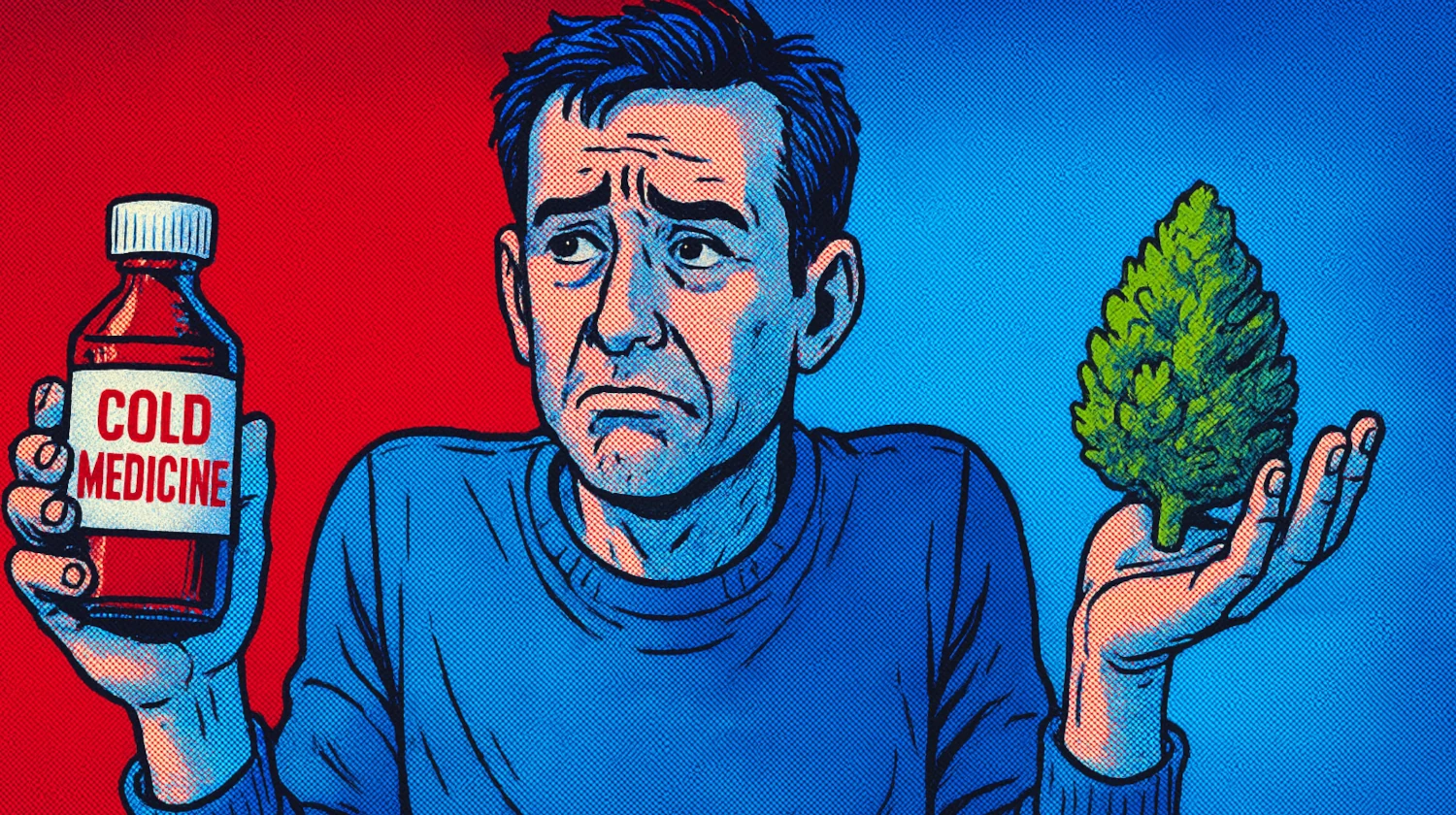Key Takeaways
- Sudafed is a common cold medicine that works by relaxing the blood vessels to relieve symptoms.
- There hasn’t been much research on Sudafed and weed.
- Some patients self-report cannabis helping with certain cold symptoms, but more research is needed to verify these claims.
Sudafed is a brand name for certain nasal decongestant drugs. Many people take it while they’re experiencing a cold or the flu. Most adults average 2-4 colds yearly, making it a prevalent condition.
If you’re currently experiencing a cold or the flu, you may wonder if you can safely take Sudafed and weed together. Are there any risks to using this combination? There are a few factors to consider when mixing these two medicines.
What is Sudafed?

While Sudafed is a brand name, it is also a drug that goes by the generic name pseudoephedrine, a common ingredient in certain products from the Sudafed brand, like Sudafed Congestion. Pseudoephedrine (Sudafed) is also found in Contac Cold, Drixoral Decongestant Non-Drowsy, and more. Pseudoephedrine shrinks enlarged blood vessels through the nasal passages, working to target blood vessels impacted by the common cold or flu. By soothing these blood vessels, individuals can get relief from their symptoms.1
Individuals often take Sudafed when they’re experiencing congestion in their noses or ears.
Possible side effects of Sudafed containing pseudoephedrine include:
- Headache
- Heightened blood pressure
- Heart palpitations
- Anxiety
If you’re concerned about the symptoms you’re experiencing after taking Sudafed, contact your doctor or a medical professional as soon as possible.
While Sudafed may be a common medication to take, it should be consumed mindfully. Be aware of other medicines that you’re taking and the effects that they can have on the body.
Combining Cannabis and Sudafed: What the Latest Research Says

There is not enough research to say for certain what the effects of this combination may be. There haven’t been major reports of problems, but without research, it’s unclear how this combination may affect users.
It is important to remember that Sudafed is both a brand name and the name for the generic drug pseudoephedrine. For example, Sudafed PE Nighttime Cold contains a blend of three drugs, one of which is diphenhydramine, which may also cause adverse side effects when combined with cannabis, including dizziness and confusion. However, this particular Sudafed medication does not contain pseudoephedrine.
There hasn’t yet been enough research examining the effects of combining Sudafed and THC. However, one study found that cannabis users had a lower amount of sinonasal symptoms. Some researchers suggest this may relate to cannabis’s anti-inflammatory potential, but this hasn’t been confirmed.2
Some people report that cannabis helps with headache discomfort, though evidence is mostly anecdotal. Anecdotal reports suggest some people find relief from headache symptoms with cannabis, though results vary and evidence is limited.3 Consider starting with a lower dose and then increasing your dose in the future if needed.
What about Sudafed and CBD?

If you don’t want to use THC, you may be wondering if it’s safe to combine Sudafed and CBD. Unfortunately, there hasn’t been much research to understand this combination.
Because CBD is non-intoxicating, some assume it may pose fewer interaction concerns, but this hasn’t been studied.
In rare cases, CBD may cause allergic reactions with symptoms like congestion or sinus irritation, making it harder to tell what’s causing the issue. Many of the symptoms that can arise from a CBD allergy are similar to the symptoms an individual would experience if taking Sudafed.
Are You Considering Using Cannabis and Sudafed?
Combining cannabis with any substance or medication carries its own risks. Cannabis research is still in its earliest stages, and there is a lot that researchers still don't know. That leaves the door open for unexpected interactions with other substances. If you are considering combining cannabis with any other substance or medication, speak to your doctor for proper medical guidance.
Likewise, stopping the use of a prescribed medication can lead to unintended consequences. Many medications take time to build up in the body. Stopping suddenly can cause unpleasant and potentially serious or even fatal side effects. If you'd like to stop using or replace a medication, you need to follow the guidance of your medical provider to make any approved adjustments safely.
References
- Głowacka K, Wiela-Hojeńska A. Pseudoephedrine-Benefits and Risks. Int J Mol Sci. 2021;22(10):5146. Published 2021 May 13. doi:10.3390/ijms22105146 ↩︎
- Reyes Orozco F, Lin M, Hur K. Cannabis Use and Sinonasal Symptoms in US Adults. JAMA otolaryngology-- head & neck surgery. 2022;148(9):854-854. doi:https://doi.org/10.1001/jamaoto.2022.2001 ↩︎
- Cuttler C, Spradlin A, Cleveland MJ, Craft RM. Short- and Long-Term Effects of Cannabis on Headache and Migraine. The Journal of Pain. 2019;21(5-6). doi:https://doi.org/10.1016/j.jpain.2019.11.001 ↩︎
The information in this article and any included images or charts are for educational purposes only. This information is neither a substitute for, nor does it replace, professional legal advice or medical advice, diagnosis, or treatment. If you have any concerns or questions about laws, regulations, or your health, you should always consult with an attorney, physician or other licensed professional.




